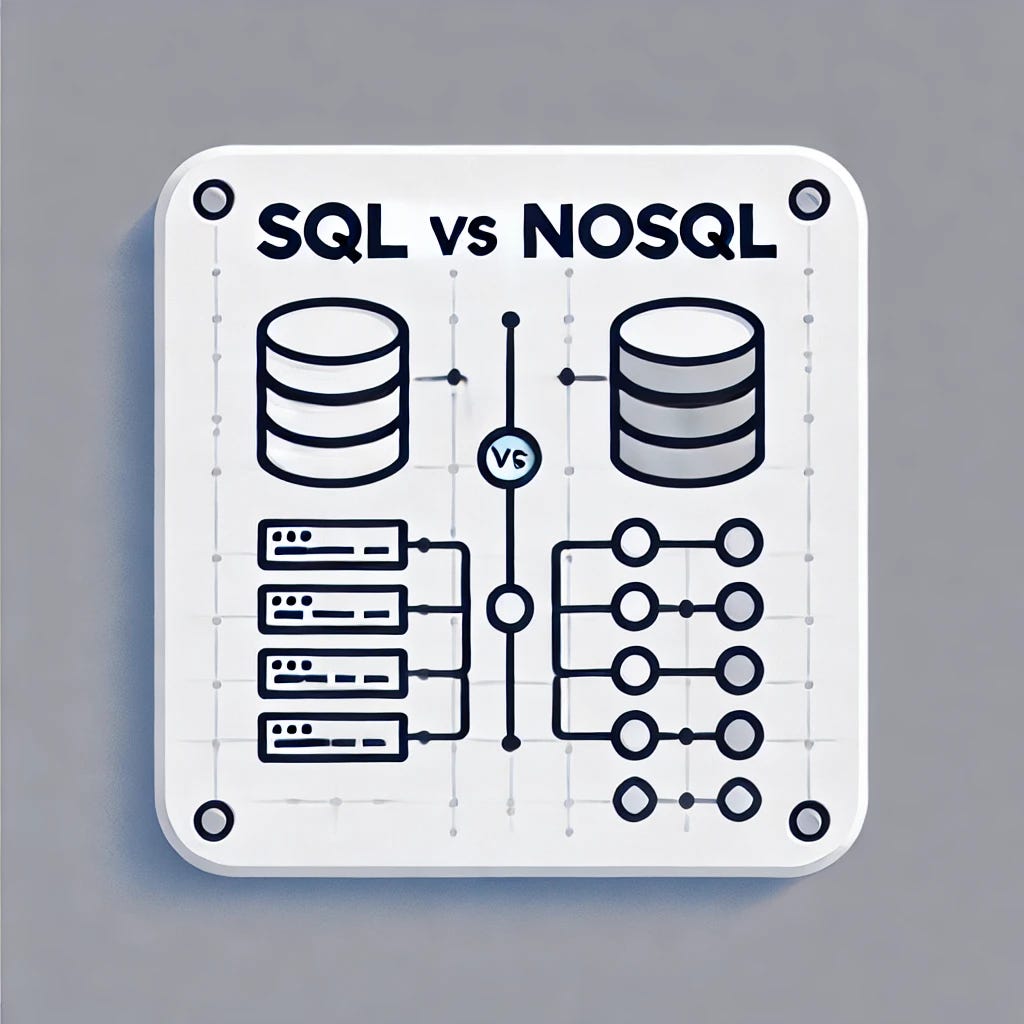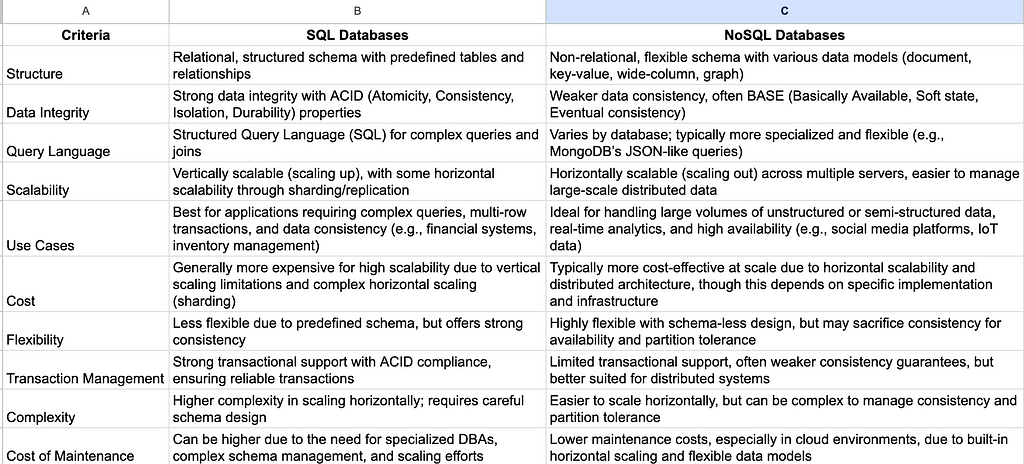
SQL vs NoSQL: Which Database Type is Right for Your eCommerce Project?
When developing and designing an eCommerce platform one of the most important choices you’ll make is selecting the correct database. There are two options: SQL (Structured query language) databases as well as NoSQL (Not only SQL) databases. Each has strengths weaknesses, strengths, and ideal applications and the most appropriate choice is based on the specific requirements and features of your eCommerce platform. This article will help you in the two types of databases as well as compare them and help you decide which one is the most suitable for your needs.

Understanding SQL Databases
Structure and Schema
SQL databases are relational, which means they employ a schema that is structured to identify data tables and the relationships between them. The schema is predefined and enforced strictly, guaranteeing the integrity of data and consistency. Examples of SQL databases include MySQL, PostgreSQL, and Microsoft SQL Server.
ACID Compliance
SQL databases are renowned for their ACID (Atomicity, Consistency, Isolation durability) characteristics, which ensure reliability of transactions and integrity of data. This makes them ideal for applications in which accuracy of data is essential for example, inventory management, financial systems and, in the future we’ll explore eCommerce platforms.
Query Language
SQL databases utilize Structured Query Language (SQL) to define and manipulate data. SQL is extremely standard, which makes it easy for developers to create complicated queries, join tables and to aggregate data. The advanced nature of the language also means that a wealth of documentation and community support is available.
Scalability
SQL databases are typically vertically scalable. This means that they expand through the addition of more power (CPU and RAM) to a server. However modern SQL databases such as PostgreSQL and MySQL provide horizontal scalability via replication and sharding, although this can be difficult to implement.
Cost Considerations
SQL databases can be costly when they are scaled vertically, since they typically require powerful hardware. Horizontal scaling is possible, but complicated, which could make costs more expensive. Furthermore, SQL databases may involve more maintenance costs due to the requirement for specialized DBAs and a careful management of schemas.
Understanding NoSQL Databases
Flexibility and Schema-less Design
NoSQL databases are not relational and usually schema-less, which allows for flexible semi-structured, unstructured, or structured storage of data. They support a variety of data models including key-value, document wide-column, graph, and key-value formats. Examples are MongoDB (document), Redis (key-value), Cassandra (wide-column) and Neo4j (graph).
CAP Theorem
NoSQL databases tend to place a high priority on flexibility and compatibility over absolute consistency as outlined in the CAP Theorem. This makes them ideal for applications that require high levels of availability, like real-time processing of data and social media platforms.
Query Language and Operations
NoSQL databases do not use a standard query language. Instead, they provide more flexible and specific query techniques that are that are tailored to the particular data model. In this case, MongoDB uses a JSON-like query language, whereas Cassandra utilizes CQL (Cassandra Query Language) which is akin to SQL but designed for data distributed.
Scalability
NoSQL databases are created with the idea of horizontal scaling in mind, making it easy to share the data over multiple servers or nodes. This is especially useful for handling large quantities of unstructured information and high-throughput tasks.
Cost Considerations
NoSQL databases are generally more efficient at scale because of their horizontal scalability, which permits them to share data across less expensive, commodity hardware. Maintenance costs are lower especially when you use managed cloud services because NoSQL databases can be scaled quickly.
Applying SQL and NoSQL to an eCommerce Platform
Scenario Overview
Consider an eCommerce site that sells products in various categories, handles shelf life and expiry dates, manages discounts, and includes other complicated features:
- Product Categories Multiple categories with an orderly structure (e.g. electronics clothing, groceries, etc.).
- Shelf Life and Expiry Product has shelf lives and those near expiration are moved to a discount section.
- Discount Management Products with a short shelf life can be discounted in advance and classified in accordance with.
- Complex queries The need for comprehensive reports, which include the level of inventory, sales by category, as well as expiration dates.
- User Profiles and Orders User information as well as order history and processing of transactions.
- Scalability The potential for a high volume of traffic specifically during sales and promotions.
- Real-time Updates Real-time inventory updates, particularly crucial for products with a limited shelf life.
Why SQL is a Strong Choice for This eCommerce Platform
- Relational Structure:
- Categories and Attributes for Products: SQL databases are ideal for managing complex relationships between categories, products and attributes (such as price dates, expiration dates and discount status). The relational structure allows simple access to data and reporting.
- Discount and Expiry Management The platform is able to manage shelf life of products and automatically sort or discount products based upon expiration dates by using SQL queries as well as triggers.
2. ACID Compliance:
- Data Integrity: SQL databases ensure data integrity and consistency, which is essential for the processing of transactions as well as inventory management and the data of users.
- Transaction Management SQL’s ACID properties ensure that every aspect of a transaction, including the updating of inventory and processing of payments are properly handled.
3. Complex Queries and Reporting:
- Inventory and Sales Reports: SQL is a perfect tool for creating complicated reports on trends in sales as well as inventories, expiration dates and much more. These reports can help in making data-driven decisions.
- User Behavior Analysis: SQL databases can effectively handle queries related to the behavior of users such as order history, or individualized recommendations.
4. Scalability:
- Horizontal and Vertical Scalability: Although SQL databases are typically vertically scalable, new SQL databases such as PostgreSQL provide horizontal scaling through methods like sharding or replication. This is useful to scale the platform as demand increases.
Why NoSQL Might Be Considered
While SQL databases are typically the best option for eCommerce platforms with the features described, NoSQL databases could still be considered in certain situations:
- Scalability requires If your platform requires handling massive amounts of processing of data across multiple systems, NoSQL databases offer better horizontal scaling.
- Flexible Data Models If the structure of your data is expected to change or if you’re dealing with semi-structured or unstructured data (e.g. user reviews or session data, etc.) then a NoSQL database may be more appropriate.
- High availability If your platform needs continuous availability, for instance during periods of high traffic or for real-time updates the architecture of NoSQL could be beneficial.
Hybrid Approach: Combining SQL and NoSQL
In certain cases an approach that is hybrid could be the best option that combines the strengths of SQL as well as NoSQL databases:
- SQL for Core Operation Utilize an SQL database to handle categories, products orders, transactions, and categories where integrity of data and sophisticated querying are essential.
- NoSQL for Flexibility and Scalability Implement the NoSQL database to handle massive amounts of user-generated data like reviews of products, user sessions and real-time data analytics. This can be combined with an SQL database to improve performance.
SQL vs NoSQL Comparison Table

Conclusion: Choosing the Right Database for Your eCommerce Platform
The choice between SQL and NoSQL databases will be guided by the specific demands of the eCommerce platform you’re making use of. SQL databases are an excellent option in circumstances where integrity of data, consistency and complicated queries are required. This makes them a great choice to the majority of eCommerce applications. On the other other side, NoSQL databases shine in situations that require scalability, flexibility as well as high availability. This is why they are ideal for managing large quantities of unstructured information as and real-time updates.
When I am working on projects that require an eCommerce platform, these aspects are crucial to deciding on the most appropriate choice for the database. By carefully taking note of the specific requirements and the possible size of the platform I can ensure that the database I select is compatible with the objectives of the undertaking and will ensure its long-term viability.
